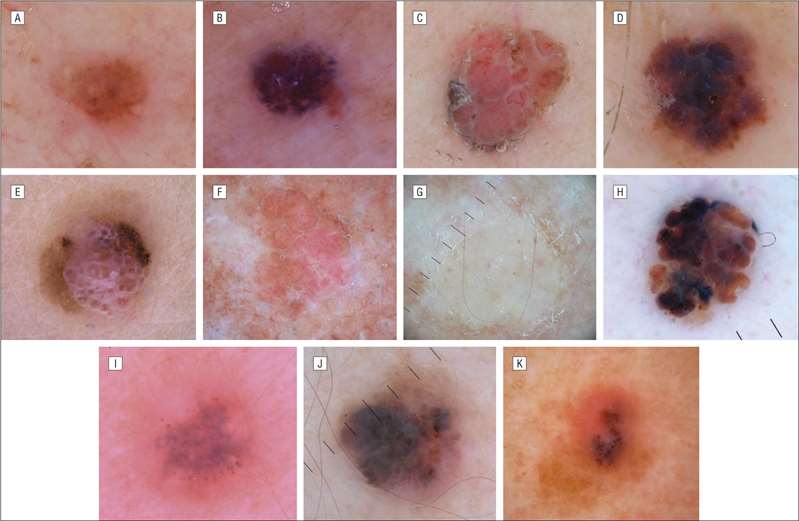Melanoma Vaccine Development Service
Creative Biolabs is a world leader in the field of cancer vaccine development. With our extensive experience and advanced platform, we are therefore confident in offering the best services for melanoma vaccine development and guarantee the finest results for our customers all over the world.
Melanoma
Melanoma, also known as malignant melanoma, is a cancer which develops from melanocytes (pigment-containing cells). Melanoma is the most dangerous type of skin cancer. Melanoma usually occurs in the skin, but rarely occurs in the intestines, mouth or eyes. Melanoma is more common in men than women. The main cause of melanoma is exposure to ultraviolet (UV) light in those people with low skin pigmentation. About 25% develop from moles with concerning changes including color changes, irregular edges, increased size, itchiness, or chapped skin. Those with more moles, family history, immunocompromised patients are more at risk.
Confirmation of clinical diagnosis is usually by a biopsy of the skin lesions. The scars or tumors are usually subsequently removed. The treatment of advanced malignant melanoma is using a multidisciplinary approach such as surgery, additional therapy, chemotherapy, immunotherapy, and radiation therapy.

Fig.1 Clinical images of thin nodular melanoma lesions [1]
Therapeutic Vaccines for Melanoma
Unlike vaccines for pneumonia, flu and other diseases, most melanoma vaccines are still in preclinical stages. Surgical excision remains the best treatment option whenever possible. Vaccines are adjuvant cancer treatments for patients who have already surgically removed melanoma tumors. However, complete spontaneous regression of melanoma has been observed in some patients and this phenomenon is thought to be mediated by the immune system. This has stimulated attempts to manipulate the immune system for therapeutic purposes. Vaccination is a form of activity-specific immunotherapy such that the response to the tumor is actively generated by the patient's immune system and targets particular cells or specific membrane antigen. Many methods for melanoma vaccination have been investigated. Large-scale phase III clinical trials using peptides, gangliosides and whole-cell tumor antigens are ongoing.
Peptide Vaccines
An interesting attempt has used multipeptide vaccines, based on their ability to expand and enhance specific immune responses. This approach has been evaluated in several cancers resulting in an acceptable safety profile and data demonstrating the induction of powerful specific CD8+ and CD4+ T cell responses. In particular, Slingluff [2] evaluated a vaccine consisting of 12 MHC class I-restricted peptides capable of stimulating the CD8+ T cell response, in combination with a HLA-DR-restricted tetanus-derived peptide in order to also stimulate CD4+ T helper cells. The peptides were emulsified in Freund’s incomplete adjuvant and administered with or without granulocyte-macrophage colony-stimulating factor (GM-CSF). In 121 melanoma stage IIB–IV resected patients, a powerful response in both CD8+ and CD4+ T cells was reported.
Another strategy followed by the most recent vaccination approaches has been based on the use of peptides, expressed on the tumor cells of patients in order to obtain more relevant tumor-specific immune responses.
Intratumoral injection, to avoid peripheral toxicity, of an interleukin-12 (IL-12) plasmid vaccine followed by electroporation in mouse melanomas demonstrated increased IL-12, interferon-gamma, and tumor lymphocytes, as well as reduced tumor vascularity. This was followed by a phase I trial of the same method in patients with metastatic melanoma with nearly half of the patients showing stabilization and partial or complete response with few side effects. A phase II trial for this approach is ongoing for Merkel cell carcinoma (MCC) with imminent anticipated completion.
Cellular Vaccines
A vaccine made from vaccinia viral lysates of an allogeneic melanoma cell (VMCL), following surgical removal of lymph node metastases, has been tested in phase II and III clinical trials. In a phase II study, the administration of the vaccine was associated with depression of natural killer cell activity against melanoma and K562 target cells in the first 3 to 6 months of treatment. Leucocyte-dependent antibody (LDA) activity against melanoma cells was induced or increased in titer in approximately half of the patients studied. For this reason, vaccines prepared from VMCL are considered a favorable method for increasing immune responses against melanoma. [3]
Creative Biolabs is a leader in the field of vaccine development and has focused on the cancer vaccines for years. We have experts who are able to help you with the melanoma vaccine development. If you are interested in our services, please contact us for more details.
References
- Kalkhoran, S. (2010). “Historical, clinical, and dermoscopic characteristics of thin nodular melanoma.” Arch Dermatol 146(3), 311-318.
- Slingluff, CL Jr. (2011). “The present and future of peptide vaccines for cancer: single or multiple, long or short, alone or in combination?” Cancer J 17 (5), 343-350.
- Hersey, P. (1986). “Phase II study of vaccinia melanoma cell lysates (VMCL) as adjuvant to surgical treatment of stage II melanoma. II. Effects on cell mediated cytotoxicity and leucocyte dependent antibody activity: immunological effects of VMCL in melanoma patients.” Cancer Immunol Immunother 22 (3): 221-231.
All of our products can only be used for research purposes. These vaccine ingredients CANNOT be used directly on humans or animals.


